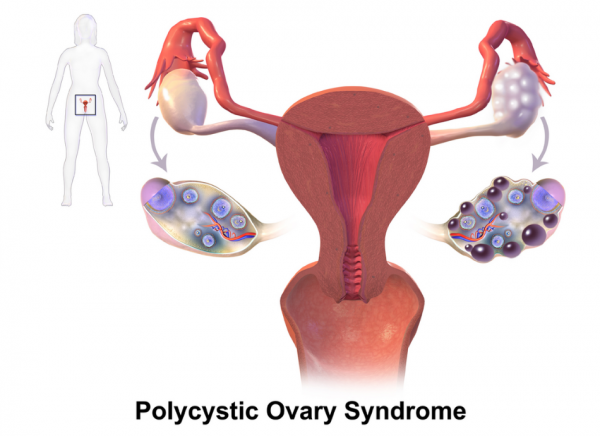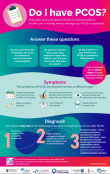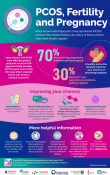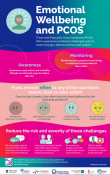Polycystic ovary syndrome (PCOS) | Huahua hua kūao
Also known as polycystic ovarian syndrome
Key points about PCOS (huahua hua kūao)
- Polycystic ovary syndrome (PCOS) is a hormonal condition that can affect many aspects of your health.
- It's associated with increased levels of 2 hormones in your body – insulin and testosterone.
- Symptoms can be mild to severe. They can include irregular periods, delays in getting pregnant, excess facial or body hair, acne, scalp hair loss, depression, anxiety and weight gain that's hard to lose.
- There are 3 diagnostic features of PCOS. If you have the first 2 (irregular periods and higher levels of androgen hormones) the third feature of having many partly formed eggs in your ovary, isn't needed for diagnosis.
- There are various ways to manage PCOS effectively. How you manage it depends on how it currently affects your daily life, and how to reduce long-term effects on your wellbeing.

If you’re of childbearing age, you generally produce an egg from an ovary every month. This process requires a fine-tuned response from a complex hormonal system. If you have PCOS, more testosterone and insulin is produced than is needed.
 Image credit: BruceBlaus via Wikimedia Commons(external link)
Image credit: BruceBlaus via Wikimedia Commons(external link)
This excess hormone stops the release of eggs from your ovary, but it doesn't stop them being produced. The eggs continue to build up in your ovaries, and this build up of immature eggs is called "polycystic ovaries". It's important to know that polycystic ovary syndrome doesn't cause actual ovarian cysts.
Video: What is PCOS? (Brief animation)
Video: Let's talk about PCOS
(Monash Centre for Health Research and Implementation, Australia, 2021)
PCOS can begin at puberty or even in early to mid-20s. It's the most common hormonal condition affecting women of childbearing age, occurring in about 10–13 out of every 100 people. PCOS can affect all life stages from adolescence to after menopause.
You may not know you have PCOS until you have difficulty getting pregnant.
What causes PCOS?
The cause of PCOS is not yet known but it might run in families. If any of your relatives are affected with PCOS, your risk of developing it may be increased.
The symptoms are related to increased hormone levels, mainly testosterone and insulin.
- Testosterone is a hormone produced by the ovaries. If you have PCOS, your ovaries produce much more testosterone than they need to. This excess is what causes many of the symptoms of PCOS.
- Insulin is a hormone that controls the level of glucose (a type of sugar) in your blood. If you have PCOS, your body may not be able to use the insulin as it should. As a result, the level of glucose in your blood becomes too high. To try to lower your blood glucose levels, your body produces even more insulin. High levels of insulin can lead to weight gain, irregular periods and fertility problems.
The symptoms vary from person to person. You may have very few or mild symptoms, or you may be affected more severely by a wider range of symptoms.
Common symptoms of PCOS
Periods and fertility
- Irregular, infrequent or no periods.
- Difficulty becoming pregnant.
- Many partly formed eggs in your ovaries.
- Excessive thickness of the endometrium (the lining of your womb/uterus) known as hyperplasia.
Hair, skin and body
- Excess hair on face, chest or tummy (hirsutism).
- Acne on face or body, can be severe.
- Hair loss or thinning of hair on your head (alopecia).
- Being overweight or experiencing a rapid increase in weight.
- Having difficulty losing weight.
Mental/emotional health
Hormonal changes and dealing with the symptoms of PCOS can cause:
- anxiety
- depression
- body image distress
- low self-esteem
- risk factors for disordered eating or eating disorders
Read more about PCOS and emotional wellbeing(external link).
What ongoing effects can PCOS have?
Having PCOS can increase your chance of developing:
- type 2 diabetes
- heart disease
- high blood pressure
- sleep apnoea.
- fatigue or sleepiness during the day
- endometrial cancer (although the risk is low)
- pregnancy complications, including:
- higher weight gain during pregnancy
- miscarriage
- gestational diabetes
- smaller babies
- pre-term (early) delivery
- caesarean section (C-section).
There are a wide range of symptoms and you don't have to have them all to be diagnosed with PCOS. Very few people have the same set of symptoms, and the symptoms can change at different stages of your life.
If you would like some help with what to ask your healthcare provider have a look at this question prompt list(external link) developed by Monash University in Australia.
To diagnose PCOS, your healthcare provider will assess your symptoms and medical history. You may need to do have some tests to confirm the diagnosis is correct and check the symptoms aren't caused by other medical conditions.
Diagnostic criteria for PCOS
To make a diagnosis of PCOS, 2 out of 3 of the following are required:
1. Irregular periods or no periods
2. Higher levels of testosterone (hyperandrogenism) as shown by:
- symptoms (eg, excess body or facial hair, acne, scalp hair loss), or
- a blood test (if you don't have any of the above symptoms).
For adults: If the first 2 criteria are both present (irregular periods and hyperandrogenism) the third criteria (ultrasound or AMH levels – see below) isn't needed.
For adolescents: The first 2 criteria are both needed, the third isn't recommended for making a diagnosis in adolescents.
3. Many partly formed eggs in your ovaries (known as polycystic ovarian morphology) as shown by:
- ultrasound (transvaginal), or
- blood test (for raised levels of anti-mullerian hormone or AMH).
While there's no cure for PCOS, there are many effective ways to reduce the symptoms and long-term effects on your health. The key to managing PCOS well is working in partnership with your healthcare team to find the best strategies for you. You may want to include your whānau and friends in your care.
Your symptom experience and quality of life, together with your concerns, values, and priorities are really important in any conversations you have about how to manage your PCOS.
PCOS support groups can also be great sources of emotional and peer-support.
There are apps specifically designed to help people with PCOS to understand and manage their condition better. Read more about PCOS apps.
Managing PCOS with lifestyle
A healthy lifestyle is recommended for all people with PCOS because it has benefits for all the features of the condition.
A healthy lifestyle includes:
- Eating a balanced and nutritious diet: No one diet is better than another for PCOS. Working with a healthcare provider is important for choosing an approach that is flexible, sustainable, allows for your food preferences, and avoids diets that are too restrictive or aren't nutritionally balanced. Read more about healthy eating.
- Being as active as possible: No one type of exercise is better than another if you have PCOS. Try to include exercise in your daily routine, talk to your healthcare provider about how to be active in a way that suits you and your lifestyle. Read more about ways to increase your activity.
- Maintaining a healthy weight: Weight management is linked to significant improvements in PCOS. You may gain weight and find it difficult to lose. You may wish to work with a healthcare provider to develop tailored goals and plans. Read more on managing your weight at the end of this section.
- Avoiding smoking and excessive drinking: Read more about how to quit smoking and alcohol and harmful drinking.
Managing PCOS with medicines
Lifestyle management is recommended for everyone with PCOS. There are also a number of medicines used to manage the different symptoms of PCOS, including medicines for acne, excess hair growth, problems with your periods and fertility issues. Some medicines may help with more than 1 symptom. PCOS affects everyone differently and your healthcare provider should work with you to decide which medicines best meet your needs. All medicines have different benefits, risks and side-effects to consider.
Contraceptive pill
The combined oral contraceptive pill is commonly prescribed to help you keep your periods regular and reduce excess hair growth by reducing the activity of the hormone testosterone. Your healthcare provider will discuss which combined oral contraceptive pill will best suit you. Generally, you will be started on a lower dose preparation or one with fewer side effects. Higher doses are used for severe symptoms.
Progestogen
You may be prescribed progestogen (a synthetic version of the hormone progesterone) so you have regular periods. Examples of progestogen are Medroxyprogesterone (Provera) and norethisterone (also called Primolut N).
Metformin
Metformin is commonly used for type 2 diabetes, but it can also help to reduce some symptoms of PCOS. It helps your body make better use of the insulin it produces. It can help with weight loss, blood pressure and may help with irregular periods.
Metformin should be used together with increased exercise and a nutritious diet, not as a replacement for a healthy approach to lifestyle. Read more abut metformin for PCOS.
Anti-androgen medicines
Anti-androgen medicines have a limited role in managing PCOS but may be considered if other therapies haven't been effective or can’t be used.
Spironolactone is used to reduce male-pattern hair growth and acne. It can reduce androgen levels, but it can take up to 6 months of daily use to work well. Read more about spironolactone.
Isotretinoin is used for severe acne that hasn’t been helped by other treatments. It shouldn't be used in pregnancy as there is a high risk of permanent damage to the unborn baby. Read more about isotretinoin and acne treatments.
Managing fertility
Having PCOS doesn't mean you can't get pregnant. Pregnancy can often be successfully achieved naturally or with assistance. If you have PCOS, the hormonal imbalance sometimes interferes with the growth and release of eggs from your ovaries (ovulation). If you don't ovulate, you can't get pregnant. Your healthcare provider or a fertility specialist can talk with you about ways to help you ovulate and increase your chance of getting pregnant.
A reproductive life plan and preconception care is recommended for people with PCOS, including healthy lifestyle, prevention of excess weight gain, and optimising preconception risk factors. It's important to have your blood pressure measured if you're planning a pregnancy or seeking fertility treatment. Excess weight is important because it can affect the chances of pregnancy, miscarriage and live birth rates following fertility treatment.
PCOS and pregnancy
In pregnancy PCOS increases the risk of:
- higher weight gain during pregnancy
- miscarriage
- gestational diabetes
- smaller babies
- pre-term (early) delivery
- caesarean section (C-section).
It's important that your healthcare provider or midwife knows you have PCOS so they can do regular checks and give you the best support during your pregnancy.
Managing excess hair
Mechanical laser and light therapies are effective for removing excess face and body hair. These options should be considered for reducing hirsutism and its impact on your quality of life, depression and anxiety.
Managing your weight
Managing your weight is associated with significant improvements in PCOS. Lifelong healthy lifestyle strategies and prevention of excess weight gain are very important in PCOS for reproductive, metabolic, and psychological health. You may wish to work with a healthcare provider to develop tailored (personalised) goals and plans.
Having PCOS may mean you're more likely to gain weight and have greater challenges with weight management. Weight stigma is a combination of negative attitudes, stereotypes, and prejudice about high body weight. Weight stigma is common and can be harmful to people with PCOS and unhelpful to PCOS management.
Having a healthy lifestyle has benefits for people with PCOS even without weight loss. While higher weight is a risk factor for PCOS and its complications, it’s only 1 indicator of health.
Apps reviewed by Healthify
You may find it useful to look at some Nutrition, exercise and weight management apps, Quit smoking apps and Mental health and wellbeing apps.
PCOS can be challenging to live with and it can affect your emotional wellbeing. Living with PCOS symptoms may affect how you 'see' yourself and may also affect your sexual relationships. It's not uncommon to experience anxiety and depression. When you are first diagnosed with PCOS you should be checked for this.
You should think about talking to a healthcare provider if you:
- feel down, depressed or hopeless
- have little interest or pleasure in doing things
- feel nervous, anxious or on edge
- are not able to stop or control your worrying.
It's much easier to take steps as soon as you notice these symptoms than later when they've become worse. You can also find a counsellor or therapist(external link) yourself.
Read more about some things that might help
PCOS can increase your chances of developing type 2 diabetes and cardiovascular disease later in life, so you need to have regular medical check-ups. Following a healthy lifestyle and preventing excess weight gain are important prevention strategies.
All people with PCOS should have the following checks:
- A heart risk assessment.
- Annual blood pressure measurement.
- Cholesterol testing.
- Blood glucose testing when you're first diagnosed and then every 1–3 years.
If you have broken sleep, daytime sleepiness or fatigue, talk to your healthcare provider. Obstructive sleep apnoea is more common in people with PCOS.
International evidence-based guideline for the assessment and management of polycystic ovary syndrome 2023(external link) Monash University, Australia
Emotional wellbeing and PCOS(external link) Monash University, Australia
PCOS, fertility and pregnancy(external link) Monash University, Australia
AskPCOS personal guide to PCOS(external link) Monash University, Australia
PCOS question prompt list(external link) Monash University, Australia, 2020
Apps
PCOS apps
Nutrition, exercise and weight management apps
Quit smoking apps
Mental health and wellbeing apps
References
- International evidence-based guideline for the assessment and management of polycystic ovary syndrome 2023(external link) Monash University, Australia, 2023
Clinical guideline
International evidence-based guideline for the assessment and management of polycystic ovary syndrome(external link) Monash University, Australia, 2023
Apps
PCOS apps
Nutrition, exercise and weight management apps
Quit smoking apps
Mental health and wellbeing apps
Continuing professional development
Polycystic ovary syndrome(external link) Goodfellow, NZ
Polycystic ovarian syndrome with Dr Anju Joham and Dr Jillian Tay(external link) The GP Show, 2023
AskPCOS(external link) Monash University, Australia
Brochures



Credits: Healthify editorial team. Healthify is brought to you by Health Navigator Charitable Trust.
Reviewed by: Dr Melanie Gibson, Senior Research Fellow, Te Tātai Hauora o Hine (National Centre for Women's Health Research Aotearoa), Te Herenga Waka (Victoria University of Wellington), and Monash Centre for Health Research and Implementation, Monash University.
Last reviewed:





